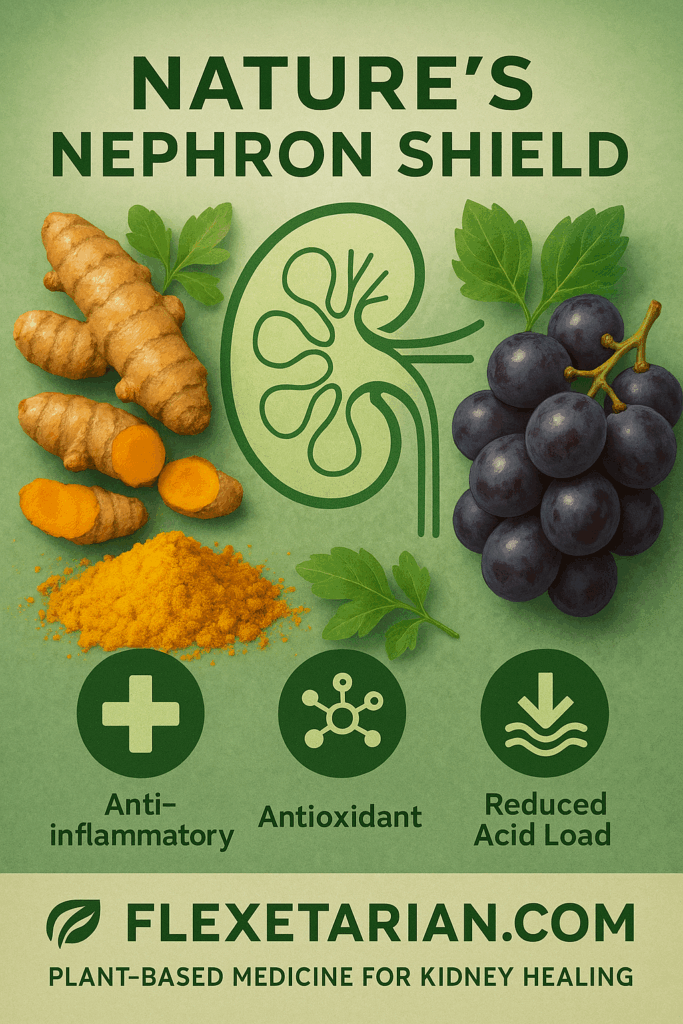
Chronic kidney disease (CKD) affects tens of millions worldwide—and diet plays a crucial role in reversing or slowing its progression. While conventional strategies focus on restriction, research now shows plant‑based medicine offers powerful benefits with fewer drawbacks. Let’s explore how nature can heal.
🥦 Why Plant-Based Medicine Works for the Kidneys
1. Antioxidant & Anti‑Inflammatory Phytochemicals
Herbs like turmeric (curcumin), red grapes (resveratrol), green tea catechins, and phenolic acids help boost the body’s antioxidant defenses—a key factor in minimizing kidney stress and damage plantpoweredkidneys.com+1plantbasedkidneys.com+1pmc.ncbi.nlm.nih.gov.
2. Reduced Acid Load & Lower Phosphorus
Plant foods produce less dietary acid than animal protein and have lower bioavailable phosphorus. Both are associated with slower CKD progression ajkd.org+3pubmed.ncbi.nlm.nih.gov+3lifestylemedicine.org+3.
3. Improved Kidney Function & Survival
Higher adherence to whole‑food, plant‑based diets is tied to lower incidence of CKD, better metabolic markers, and a significant reduction in all‑cause mortality among CKD patients kidney.org+14pubmed.ncbi.nlm.nih.gov+14kidney.org+14.
🌿 Top Botanical Allies for Kidney Support
| Plant / Compound | Benefits for Kidneys | Notes |
|---|---|---|
| Turmeric / Curcumin | Anti‑inflammatory, antioxidant | Helps reduce oxidative damage |
| Resveratrol (grapes) | Protects kidney cells | Reduces fibrosis and injury |
| Astragalus | Enhances renal function, proteinuria control | Used in Chinese herbal protocols en.wikipedia.org+2pmc.ncbi.nlm.nih.gov+2verywellhealth.com+2health.com+14plantpoweredkidneys.com+14plantbasedkidneys.com+14frontiersin.org+1pmc.ncbi.nlm.nih.gov+1verywellhealth.com+8en.wikipedia.org+8sciencedirect.com+8 |
| Chrysophanol (found in rhubarb) | Reduces renal fibrosis & diabetic nephropathy | |
| Geniposide (from Gardenia fruit) | Anti‑oxidative, anti‑inflammatory; accumulates in kidney | |
| Wolfiporia extensa | Natural diuretic via aldosterone antagonism |
Caution: Always consult a healthcare provider before taking herbal supplements—especially in CKD. Some have interactions or are contraindicated. The National Kidney Foundation advises patients to inform their care team if using herbal products .
🥗 Practical Flexetarian Strategies
- Use plant‑based spices daily: Incorporate turmeric, garlic, parsley, oregano, and thyme. These herbs offer kidney support and boost flavor.
- Swap animal protein for legumes & whole grains: Beans, lentils, tofu, oats and quinoa provide fiber, lower acid load, and healthy protein drbismah.com+5plantbasedkidneys.com+5plantpoweredkidneys.com+5lifestylemedicine.org+2health.com+2plantpoweredkidneys.com+2.
- Embrace antioxidant-rich produce: Berries, leafy greens, tart cherries, and avocados support kidney wellness through antioxidants and anti‑inflammatory flavonoids .
- Include evidence‑based botanical supplements under medical supervision: e.g., astragalus or low-dose turmeric.
- Monitor key labs: Track GFR, electrolytes, phosphorus, and vitamin D, adjusting dietary and supplement choices accordingly.
📚 What the Latest Science Says
- A 2024 review confirms plant‑based diets improve survival and metabolic profiles in CKD, with minimal risk en.wikipedia.orglifestylemedicine.org+1plantpoweredkidneys.com+1plantbasedkidneys.com+14pubmed.ncbi.nlm.nih.gov+14clinmedjournals.org+14.
- A 2023 clinical trial showed plant‑dominant dietary patterns slowed CKD and enhanced toxin clearance and gut health .
- Chinese herbal blends combining botanicals with Western medicine significantly delayed progression to dialysis in advanced CKD sciencedirect.com.
✅ Bottom Line
Plant‑based medicine is more than nutrition—it’s therapy. Combining whole foods, spices, and select botanicals under medical guidance offers a holistic path to protect, heal, and thrive with kidney disease. Flexetarian principles allow flexibility and personalization, helping readers optimize kidney wellness without deprivation.









Recent Comments